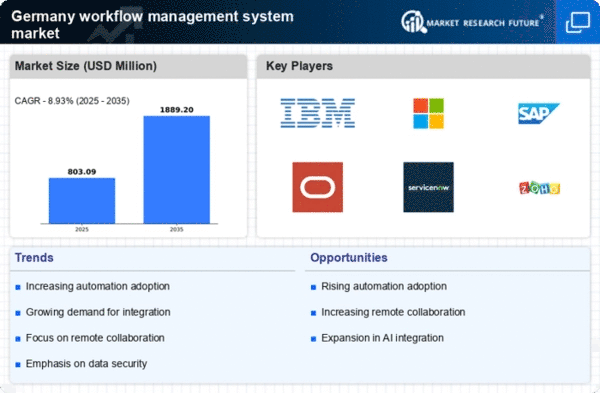Rising Demand for Efficiency
The workflow management system market in Germany experiences a notable surge in demand for efficiency across various sectors. Organizations are increasingly recognizing the need to streamline operations, reduce redundancies, and enhance productivity. This trend is particularly evident in industries such as manufacturing and services, where operational efficiency can lead to significant cost savings. According to recent data, companies that implement effective workflow management systems can achieve productivity improvements of up to 30%. As businesses strive to remain competitive, the adoption of these systems is likely to continue growing, driving the market forward.
Regulatory Compliance Pressures
The regulatory landscape in Germany imposes stringent compliance requirements on businesses, thereby impacting the workflow management-system market. Organizations are compelled to adopt systems that ensure adherence to various regulations, including data protection and industry-specific standards. This necessity drives the demand for workflow management solutions that incorporate compliance features, enabling businesses to mitigate risks associated with non-compliance. Recent reports suggest that non-compliance can result in fines exceeding €1 million for companies, underscoring the importance of investing in effective workflow management systems to navigate these challenges.
Shift Towards Remote Work Solutions
The ongoing shift towards remote work in Germany has a profound impact on the workflow management-system market. As organizations adapt to flexible work arrangements, the need for robust digital solutions that facilitate collaboration and task management becomes paramount. This transition has led to an increased investment in workflow management systems that support remote teams, enabling seamless communication and project tracking. Recent statistics indicate that approximately 60% of companies in Germany have adopted some form of remote work, further propelling the demand for effective workflow management solutions tailored to this new work environment.
Emphasis on Data-Driven Decision Making
In the current landscape, the emphasis on data-driven decision making significantly influences the workflow management-system market in Germany. Organizations are increasingly leveraging data analytics to optimize processes and enhance operational performance. By integrating workflow management systems with advanced analytics tools, businesses can gain valuable insights into their operations, leading to informed decision-making. This trend is reflected in the fact that around 70% of German companies are prioritizing data analytics in their strategic planning. Consequently, the demand for workflow management systems that facilitate data integration and analysis is expected to rise.
Technological Advancements in Software Solutions
Technological advancements play a crucial role in shaping the workflow management-system market in Germany. The continuous evolution of software solutions, including artificial intelligence and machine learning, enhances the capabilities of workflow management systems. These innovations enable organizations to automate complex processes, improve accuracy, and reduce manual intervention. As a result, businesses are increasingly inclined to invest in advanced workflow management solutions that leverage these technologies. Current estimates indicate that the market for AI-driven workflow management systems could grow by over 25% annually, reflecting the potential for significant transformation in operational efficiency.
















